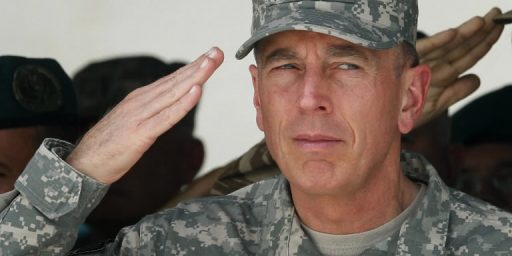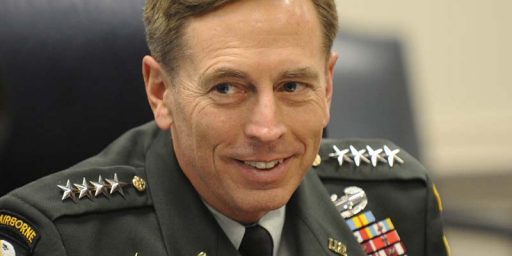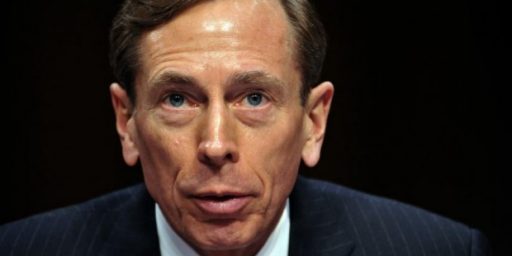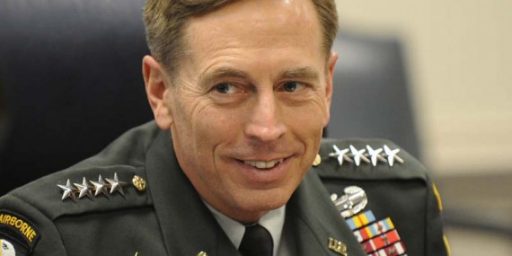Petraeus’ Poll Surge
The anticipation of testimony by General David Petraeus and Ambassador Ryan Crocker has had the desired effect of moving public opinion on the war, albeit modestly.
Public discontent with the Iraq war has eased slightly, a new Wall Street Journal-NBC News poll shows, suggesting President Bush may have a little more maneuvering room at a critical point in debates over war costs and troop levels. As Mr. Bush prepares to follow congressional testimony by the top general in Iraq, David Petraeus, with a televised speech to the nation tonight, the poll shows an uptick in support for the president’s handling of the war as well as a small increase in the proportion of Americans who believe the troop surge is helping and that victory remains possible.
Those shifts in public opinion remain modest. Solid majorities continue to disapprove of the president’s performance and say victory in Iraq isn’t possible and that the war hasn’t been worth its human and financial costs. “There’s been no surge from the American people,” said Democratic pollster Peter Hart, who conducts the Journal/NBC poll with Republican counterpart Neil Newhouse[*]. Yet only one in four Americans say troops should leave now regardless of conditions on the ground. The public’s “heads and hearts are going in two different directions,” Mr. Newhouse said. “They want the troops to come home but think we can’t just leave.”
That’s exactly right, I think; indeed, that seems to be the consensus within the foreign policy community as well. Aside from a few wild-eyed neoconservatives, nobody thinks we’re about to win in Iraq; few think we can win at all, at least as defined by the original grandiose vision of Iraq as a model that would cause democracy to germinate across the Arab Middle East. Still, enough people are persuaded that things would be even worse if we leave now that they’re begrudgingly willing to keep plugging away the proverbial “another six months.”
The slight improvement in Iraq sentiment followed extensive news coverage anticipating the testimony of Gen. Petraeus and U.S. Ambassador to Iraq Ryan Crocker. The telephone survey of 1,002 adults was conducted Sept. 7-10, with most interviews completed before their Monday testimony; the survey’s margin of error is 3.1 percentage points.
[…]
The proportion of Americans who say the war remains winnable has edged up to 37% from 32% in July, while the majority who say it isn’t has diminished to 56% from 62%. The proportion saying the troop surge is helping the situation on the ground has risen to 33% from 29% in July and 24% in April.
Mr. Bush’s approval rating on Iraq still is paltry, at 30%. But that is up from 22% in July, while approval for his handling of the economy remained unchanged at 38%. The change in his Iraq approval rating, driven by improved marks among Republicans, independents and men, pushed Mr. Bush’s overall approval rating up to 33%, from 31% in July.
This movement is indeed modest; indeed, some of the fluctation is within the margin of sampling error. Further, it’s rather odd that WSJ/MSNBC fielded the survey before the testimony was complete. It’ll be interesting to see whether the numbers continue to ascend in the wake of the testimony, plummet because of over-high expectations, or remain static.
____________
*Full disclosure: Newhouse is a partner at Public Opinion Strategies, where my wife is COO.






Unfortunately, James, a significant number of those wild-eyed types are currently in 1600 Penn. Ave.
Lookit: assuming Bush does come on tonight and endorse the Petraeus plan of bringing back some number of troops (maybe 30k, maybe 5 BCTs; he’s already fudging his numbers), that’ll simply bring us back to the troop level we were at before the surge started, occupying an Iraq that is in no better shape (and, by many measures, is demonstrably worse off) that when we started surging.
Also, Pelosi and others are rightly smacking anyone who refers to this as any kind of force reduction – it’s plainly not. Next summer is exactly when the now-standard 15-month tours of duty for all those surging forces end – we have to bring them home no later than then, or boost the tour lengths yet again. And SecDef Gates has already made his “no new taxes” pledge on that front.
Basically, by any standard you care to chart, the surge has been a miserable, tragic failure. Unless you chart it on the effect of pushing any solution off onto the next administration, at which it has been quite successful…
Two points here:
1> It is possible to win this war by whatever definition you want to use. At the same time, I don’t think we will “win” it in the sense that Iraq will become a stable democracy simply because it will take too long. Even with a concerted, unified effort it won’t happen in my lifetime (and I expect to live another 40 years or so).
2> If there is a “modest” rise in poll numbers and this coming before Gen. Petraes testifies before Congress, one should wonder what caused the rise. I hope that it came from the general public educating themselves on the situation in Iraq. It would reinforce my faith in the American public to do what is right when it is most needed. And it could be an early death knell for the MSM.
Perhaps the huge pr blitz in the run up to the testimony. Any move after the testimony will likely be modest. If the move is in the positive direction (from the admin pov) then prepare for this to be touted by the msm and admin as a trend that is likely to continue.
That would tend to push the poll numbers in the other direction.
Yep. It’s definitely not working:
The Ghosts of Anbar, Part I
The Ghosts of Anbar, Part II
The Ghosts of Anbar, Part III
The Ghosts of Anbar, Part IV
It’s difficult not to notice that everything the General said exactly mirrored what Bush has been saying for the last month or so (after which he would typically add, “…but well have to wait to see what the General says).
I guess that means that the president is the most prescient man in the universe, I mean what are the odds that the General’s report would be exactly and precisely what the president has been saying all along.
I’m impressed.
You realize that Bush actually has access to Petraeus, and vice versa, on a regular basis, right?
You realize that Bush actually has access to Petraeus, and vice versa, on a regular basis, right?
Then why for the last two months has the president been acting like he needs to see the report to know what was going to be in it. Way all the, “… I need to hear what the general has to say.” BS.
Gee whiz James Is there nothing about this whole dog and pony show that you think wasn’t prepared, bought, and paid for?
Oops … should be … was prepared, bought, and paid for?
No doubt there was some stagecraft to gain breathing room. Events on the ground are actually moving, though, and there was some legitimacy to the wait and see approach. I agree, however, that the conclusion — We need more time, it’s working! — was likely inevitable.